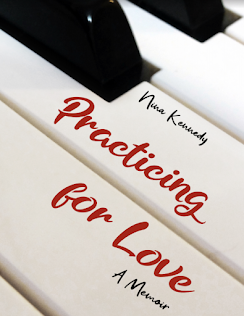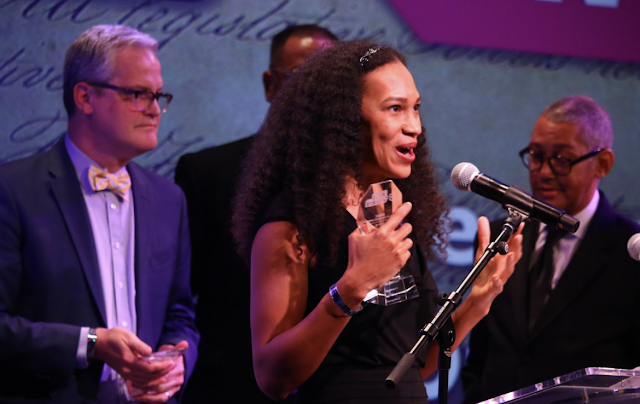"Practicing for Love" - A Review by Michelle Veras
Practicing for Love - A Review
By Michelle Veras
September 28, 2020
Practicing for Love, Nina Kennedy’s recently published memoir, is a beautiful chronicle of the author’s childhood, lifelong passion for music, and her journey from Tennessee to New York City, and eventually, across the globe.
The text is an intimate glimpse into Kennedy’s early life as a child prodigy, and later, her career as an internationally acclaimed classical pianist. Along the way, Kennedy confronts the complex and interconnected realities of racism, sexism, and homophobia.
The only child of musician parents, Ms. Kennedy spent her childhood immersed in the world of classical music. The author recounts her experiences traveling to performances with her parents, sitting in on the classes they taught at Fisk University, and the countless hours she spent practicing at the piano. For those of us with fairly limited knowledge of classical music, Kennedy’s memoir lays bare her conflicted feelings about her choice to pursue a career as a professional musician. Kennedy artfully describes the intense pressure she encountered from family throughout her youth and well into adulthood. Much of this pressure stemmed from her parents desires to see her achieve success and acceptance in the world of classical music. Their own careers had been limited by the racism they encountered. Facing the reality that her parents looked to her to carry out their own dreams of success, Kennedy dutifully honed her talent as a supreme pianist. Kennedy’s parents failed to understand that she herself would be limited by systems of oppression so deeply ingrained in the music business. Not unlike her parents, Ms. Kennedy was forced to contend with professors, administrators, agents, and “show business types” who fully embraced racist and sexist ideologies. In many cases, these people acted as gatekeepers, denying access to a world that Kennedy worked so diligently to enter into. Kennedy’s parents did little to shield her from the harsh realities of racism and sexism - instead they pushed her to improve her playing, almost believing that if her playing were flawless, she could overcome barriers of race and gender. With each turn of the page, the reader is drawn into Kennedy’s deep struggle to achieve success in the eyes of her parents.
Ms. Kennedy’s memoir is much more than the tale of a child prodigy. It is the story of a black woman from the South, coming into her identity as a lesbian, an artist, and a romantic partner. Kennedy weaves a distinct thread that connects her family dynamics to the formation of these adult identities. Ms. Kennedy’s remarkable accomplishments are a tribute to her perseverance and courage. This is true not only in her musical career, but in her “practice” of love. It is through her relationships with romantic partners that Kennedy deeply explores the many facets of her artistry and her spiritual identity. Through her recounting of a particularly significant relationship, Kennedy shares the heartbreak of navigating a partner’s cancer diagnosis. As a person working in public health, with a focus on the disparate impacts of cancer on LGBTQ+ communities, this portion of Kennedy’s memoir was of great interest to me. All too often, mainstream conversations about cancer do not include the voices of queer patients and caregivers. This complexity of this relationship grounds readers in the nuances of loving someone with cancer, and the ways in which the illness can forever alter one’s life course.
New York City serves as the backdrop for much of the author’s adult life, providing the foundation for her exploration of writing, spoken word, and television. For queer readers, Kennedy’s descriptions of the city’s gay and lesbian hot spots of the 80s and 90s inspire a longing for a queer community that is hard to come by outside the city’s boroughs.
Kennedy’s narrative is a descriptive tale overflowing with each of her experiences more extraordinary than the last. Ms. Kennedy is no stranger to performing in front of sold out crowds and receiving standing ovations. The reader revels in her anecdotes of international travels, encounters with celebrities, and romantic adventures.
Not only is Kennedy’s book meaningful for readers interested in pursuing music professionally; it is an important book about the intersections of gender, race, class, and sexual orientation. Kennedy’s ability to voice how each of these shaped her career is unmatched.
The almost fantastical world of Nina’s musical sphere is one that not many will ever access. The reader is left wanting more. In reading the memoir, I longed for a deeper insight into the impact of all these experiences on Kennedy’s world view. With each chapter, the reader is treated to the exploration of Kennedy’s newest creative endeavor and her ongoing pursuit of musical success. I truly hope that the author is indeed at work on a follow up to her first book; I look forward to reading how she continues to make her mark on New York City and the larger art world.
About the reviewer
Michelle Veras, MPH, is a queer, mixed-race activist living in Providence, RI. With a background in youth work and public health, she has spent over fifteen years working in communities for social change. She is a graduate of the School of Public Health at Brown University and currently serves as Projects Director at the National LGBT Cancer Network. Here she leads a number of initiatives focused on LGBTQ+ health, with a spotlight on cancer and tobacco. She approaches the elimination of cancer and tobacco disparities as core components of social justice work.
Order your copy of Practicing for Love at www.infemnity.com/shop.





Comments
Post a Comment